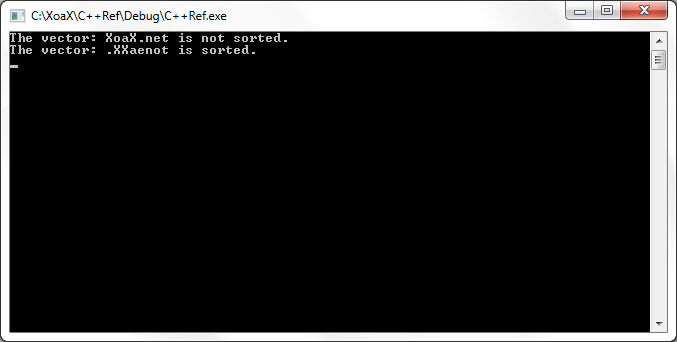algorithm - STL C++
is_sorted()
Declaration
template <class FwdIterator> bool is_sorted( FwdIterator xFirst, FwdIterator xLast );
Description
This function tests the range of entries starting at "xFirst" up to the one before "xLast" to determine whether the set of all entries in the range are sorted. In the overloaded version, the function "xComp" is used as the ordering function.Header Include
#include <algorithm>
Overloads
template <class FwdIterator, class BinaryPredicate> bool is_sorted( FwdIterator xFirst, FwdIterator xLast, BinaryPredicate xComp );
Example
#include <iostream>
#include <vector>
#include <algorithm>
int main()
{
using namespace std;
// Create a vector instance
vector<char> qV;
qV.push_back('X');
qV.push_back('o');
qV.push_back('a');
qV.push_back('X');
qV.push_back('.');
qV.push_back('n');
qV.push_back('e');
qV.push_back('t');
vector<char>::iterator qIter;
// Output the vector
cout << "The vector: ";
for (qIter = qV.begin(); qIter != qV.end(); ++qIter) {
cout << *qIter;
}
// Sort test
bool bIsSorted = is_sorted(qV.begin(), qV.end());
cout << (bIsSorted ? " is " : " is not ") << "sorted." << endl;
// Sort the vector
sort(qV.begin(), qV.end());
// Output the new vector
cout << "The vector: ";
for (qIter = qV.begin(); qIter != qV.end(); ++qIter) {
cout << *qIter;
}
// Sort test
bIsSorted = is_sorted(qV.begin(), qV.end());
cout << (bIsSorted ? " is " : " is not ") << "sorted." << endl;
// Keep the window open
cin.get();
return 0;
}Output

© 2007–2024 XoaX.net LLC. All rights reserved.
